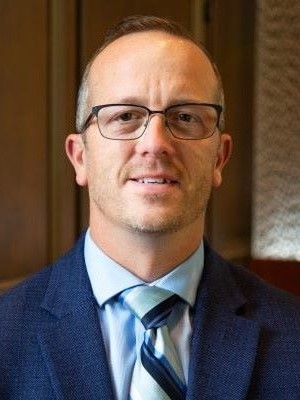
Ryan Desgrange
PHYSICIAN ASSISTANT
Graduated in 2008
Advance Practice Provider Director, Henry Ford Health
Immediate Past President, MAPA
Q: Why did you choose Wayne State?
A: Because of the PA program’s vision to serve the underserved. It is at the core of my heart, to give everyone the same opportunities in accessing health care. Additionally, being located on the larger medical campus and diversity in both patients and medical professionals.
Q: What inspired you to pursue Physician Assistant Studies?
A: Failure to qualify for the Olympic Trials in the marathon made me rethink my focus in life. While I was working at the Rehabilitation Institute of Michigan, a physical therapist told me about the physician assistant profession, and the rest is history.
Q: What was your most challenging class?
A: Pathophysiology. I loved the class, but the lectures were long and the information overload was extreme — but helped in understanding complex pathologies.
Q: Who was your most memorable instructor?
A: John McGinnity. He was a raw and down-to-earth professor and leader. I admired how he drew students to him and mentored them into clinically practicing PAs.
Q: Share some reflections about your time at WSU.
A: It was a whirlwind of education, personal and professional growth, and the building of friendships that would never have otherwise happened. Living in the basement of my in-laws’ house after being newly married and carpooling with four female students sounds like a sitcom. In actuality, the friendships formed throughout our educational endeavors made me who I am today. My professors pushed me to be better than myself to deliver the care that patients need and deserve. This commitment to educational excellence embodies the true essence of being one of the privileged alumni graduating from WSU.
Q: In your opinion, what is one of the biggest changes that has occurred in your profession since graduating?
A: The passage of PA 379 that removed unnecessary barriers to physician assistant practice by allowing PAs to be independent prescribers removed physician/PA ratios and allowed PAs to practice with a participating physician through a practice agreement, removing the terms “supervision” and “delegation.” This was a huge step forward in the PA profession!
Q: Share a career highlight.
A: I started my career as a physician assistant in the emergency room and it helped develop me into a well-rounded health care professional with the confidence to provide value-based care. It wasn’t until I transitioned into orthopedics that my love for teaching and leadership developed. I started with Henry Ford Health in 2015 as an orthopedic trauma PA practicing clinically and had the joy of precepting numerous PA students throughout my career. My passion for sharing my love of the profession allowed me to inspire young students and contributed to being awarded preceptor of the year from my health system and WSU.
My extrovert personality was continually tested, and I became a stronger leader by forcing myself to lecture on local, state and national platforms. Advocating for the great care that PAs deliver every single day was part of the reason I served as past president of the Michigan Academy of Physician Associates. I embraced ongoing education, professional growth, and care delivery by obtaining my Doctor of Medical Science in Administrative Medicine, followed shortly by a Fellowship for Digital Entrepreneurs in 2023. I can wholeheartedly say that Wayne State University gave me the confidence to be better than myself and give selflessly back to my community and profession. I truly hope to continue to inspire others to push themselves to be more and do more with the life they are given so that they too can inspire others who are the future of health care.
The Physician Assistant Studies master of science degree program at the Wayne State University Eugene Applebaum College of Pharmacy and Health Sciences is focused on the development of highly competent and passionate physician assistants who are deeply committed to practicing in urban and underserved health care settings. It is the highest ranking program in Michigan and among the top 50 programs in the nation, as ranked by U.S. News & World Report for 2023-24. The admission cycle runs from May 1-Sept. 1 for classes beginning the following May. Prospective students can get started by attending a WSU Applebaum information meeting at 6 p.m. on the first Tuesday of each month.
An anchor in urban health care
The Eugene Applebaum College of Pharmacy and Health Sciences is built on more than 100 years of tradition and innovation in the heart of Detroit. We have grown deep roots in our city, harnessing its powerhouse hospital systems and community service organizations as vibrant, real-world training grounds for students, with an ongoing focus on social justice in health care. And our research at all levels – from undergraduates to veteran faculty members – translates into creative solutions for healthier communities.
Wayne State University is a premier urban research institution offering approximately 350 academic programs through 13 schools and colleges to nearly 24,000 students.